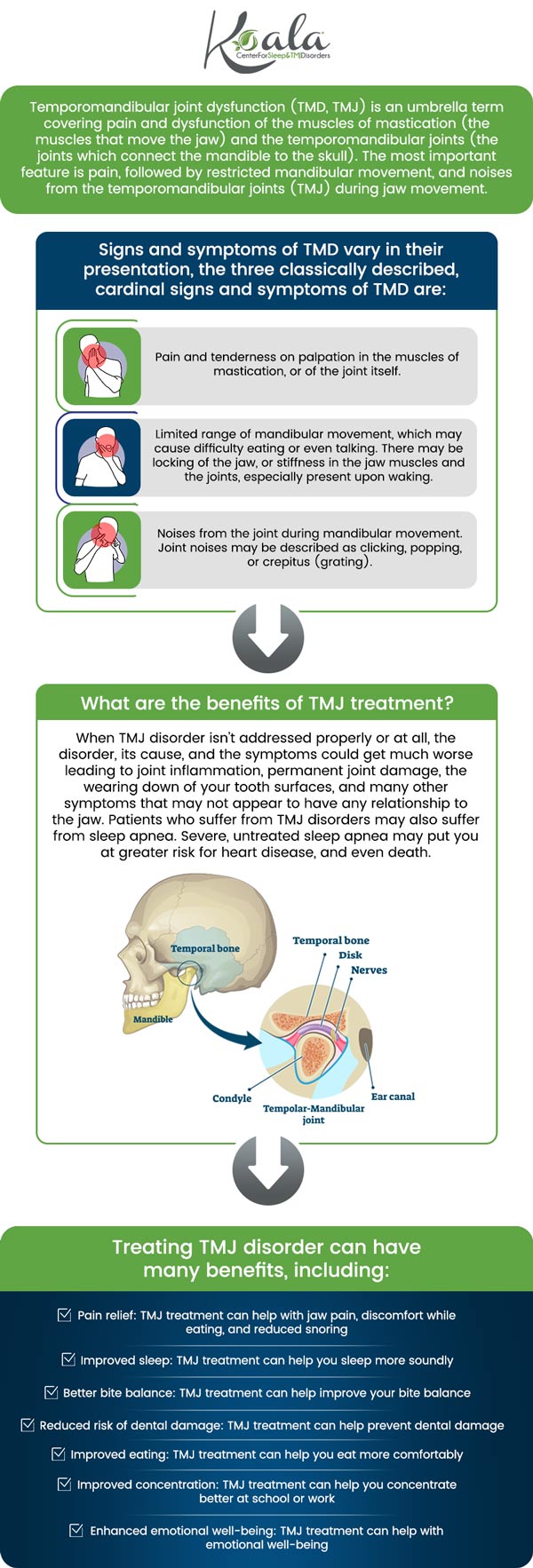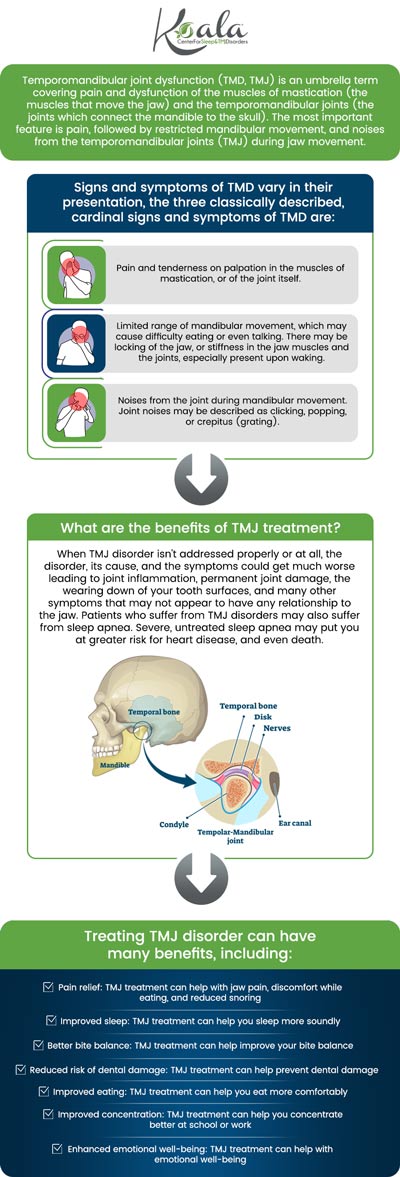Jaw Pain and TMJ Symptoms Treatment in Wausau, WI
Jaw pain can be associated with TMJ disorder if you are experiencing it with other symptoms such as inflammation, misalignment, or continuous discomfort in the jaw. A proper diagnosis is necessary to start the treatment. If you are having the symptoms mentioned, talk to our TMJ specialists at Koala Center For Sleep & TMJ Disorders. For more information, please contact us or request an appointment online. We are conveniently located at 413 North 17th Avenue Ste. #100 Wausau, WI 54401.


Table of Contents:
Is jaw pain a symptom of TMJ?
What are the other symptoms of TMJ associated with jaw pain?
What are the treatment options available for TMJ?
Are you suffering from jaw pain caused by TMJ?
Jaw pain is a common symptom treated at Koala Center For Sleep & TMJ Disorders, which specializes in diagnosing and managing conditions related to temporomandibular joint (TMJ) disorders. The temporomandibular joint connects your jawbone to your skull, facilitating essential movements like speaking, chewing, and yawning. When this joint experiences stress, inflammation, misalignment, or dysfunction, patients often report pain and discomfort in the jaw area. TMJ-related jaw pain can range from persistent aches and tenderness to sharp, stabbing sensations, especially noticeable while eating, talking, or opening the mouth widely.
At Koala Center For Sleep & TMJ Disorders, we understand that TMJ pain frequently extends beyond the jaw and can radiate to surrounding areas such as the ears, face, temples, neck, and shoulders. Patients commonly experience additional symptoms, including clicking or popping noises in the jaw, limited range of motion, stiffness, difficulty fully opening or closing the mouth, and headaches. Our specialized team is skilled in distinguishing TMJ disorders from other possible causes of jaw pain, such as dental issues, sinus infections, arthritis, or trauma-related injuries.
Our patients frequently report facial pain, tenderness, or swelling around their jaw joints. Headaches, such as tension headaches or migraines, are also common symptoms associated with TMJ disorders. Additionally, ear-related symptoms including earaches, tinnitus (ringing in the ears), or a feeling of ear fullness and pressure can occur. Many patients are unaware that TMJ dysfunction can even lead to neck and shoulder pain, as tightness and tension from strained jaw muscles radiate outward.
At Koala Center For Sleep & TMJ Disorders, we also recognize that TMJ conditions can lead to changes in bite alignment or the way your teeth fit together, causing discomfort and difficulty chewing. Teeth clenching or grinding (bruxism), often related to TMJ disorders, can result in increased tooth sensitivity and dental wear. Fatigue or soreness in your facial muscles, particularly after extended periods of chewing or speaking, may also indicate underlying TMJ dysfunction.
If you are experiencing persistent jaw pain or any of these associated symptoms, our dedicated team at Koala is here to provide thorough evaluation, accurate diagnosis, and customized treatment plans. We focus exclusively on addressing TMJ disorders and sleep-related conditions, ensuring compassionate care and effective solutions tailored specifically for you.
TMJ disorders occur when there’s discomfort or dysfunction in the joint connecting your jawbone to your skull. At Koala, we carefully evaluate your unique condition, symptoms, and overall health to develop a customized treatment plan tailored specifically for you.
In the initial phase of treatment, we emphasize conservative, non-invasive methods to alleviate symptoms and improve function. These approaches may include lifestyle modifications such as dietary adjustments to softer foods, guided self-care practices, gentle jaw exercises, and stretching techniques. We also provide personalized recommendations for applying heat or ice therapy to soothe pain and reduce inflammation.
When appropriate, our specialists might recommend medications to manage TMJ symptoms effectively. Anti-inflammatory medications (NSAIDs) can help reduce inflammation and alleviate pain, while muscle relaxants may be prescribed to relieve muscle tension and spasms associated with your condition.
We also offer specialized physical therapy techniques tailored to your individual needs. This therapy focuses on strengthening and stretching your jaw muscles, enhancing joint mobility, and significantly reducing discomfort.
Additionally, customized dental solutions, such as oral splints or mouth guards, can offer meaningful relief by reducing pressure on the temporomandibular joint and preventing teeth grinding—particularly beneficial if nighttime bruxism is exacerbating your symptoms. In some cases, dental adjustments or orthodontic treatments may also be recommended to correct bite alignment issues that contribute to your TMJ discomfort.
If your symptoms persist despite conservative treatment, minimally invasive interventions may be considered. Arthrocentesis (a joint-flushing procedure) or arthroscopic surgery (a minimally invasive approach to address structural issues within the joint) can be effective options to relieve pain and improve joint function. In rare and severe cases, open joint surgery may be required.
Your comfort and overall health are our top priorities at Koala Center For Sleep & TMJ Disorders. We are committed to working closely with you to determine the most effective, least invasive treatment strategies for restoring your jaw function, alleviating pain, and improving your overall quality of life.
Jaw pain caused by temporomandibular joint (TMJ) disorder can greatly impact your daily comfort and overall well-being. We specialize in diagnosing and treating conditions related to the temporomandibular joint—the hinge connecting your jawbone to your skull. This joint allows you to perform essential everyday functions such as speaking, chewing, and yawning. Pain in this area may develop due to various factors, including stress-related muscle tension, arthritis, jaw misalignment, or injury.
Common symptoms associated with TMJ disorders include tenderness around the jaw joint, clicking or popping sounds when opening or closing your mouth, discomfort or difficulty while chewing, facial pain, headaches, and limited jaw movement. Some individuals may even experience earaches or ringing in the ears (tinnitus).
If you suspect your jaw pain might be related to a TMJ disorder, it’s important to consult with healthcare professionals who specialize in TMJ conditions. At Koala Center For Sleep & TMJ Disorders, our experienced team will thoroughly evaluate your symptoms, perform a comprehensive examination, and develop a personalized treatment plan tailored specifically to your needs.
Early diagnosis and intervention are key to preventing further discomfort and complications. If jaw pain is affecting your daily life or causing frequent distress, our caring professionals at Koala Center For Sleep & TMJ Disorders are here to help you regain comfort and improve your quality of life.
If you’re experiencing jaw pain or TMJ symptoms in Wausau, WI, the providers at Koala Center for Sleep & TMJ Disorders are here to help you find lasting relief. Our experienced team specializes in diagnosing and treating temporomandibular joint (TMJ) disorders, offering personalized treatment options designed to address both the symptoms and underlying causes of your discomfort.
We begin by thoroughly evaluating your condition to determine the best course of action. Treatment options may include non-invasive therapies like custom mouthguards, which can reduce teeth grinding and jaw tension; physical therapy to strengthen and relax the jaw muscles; and stress management techniques to alleviate pressure on the jaw. For more severe cases, we may recommend orthodontic treatments or other targeted solutions to improve jaw alignment.
At Koala Center for Sleep & TMJ Disorders, our goal is to provide comprehensive care in a comfortable and welcoming environment. We take a holistic approach to treatment, ensuring that your unique needs are met with a personalized plan that works for you. Whether you’re dealing with mild or chronic jaw pain, our providers are dedicated to helping you find relief and restore your quality of life. For more information, contact us. We serve patients from Wausau WI, Schofield WI, Weston WI, Rothschild WI, Brokaw WI, and surrounding areas.

Additional Services You May Need
▸ KoalaKIDZzz®
▸ Sleep Apnea
▸ Snoring
▸ TMJ Disorder
▸ Fatigue
▸ Sleep Disorders
▸ Weight Loss
▸ CPAP Alternative
▸ Oral Appliances




